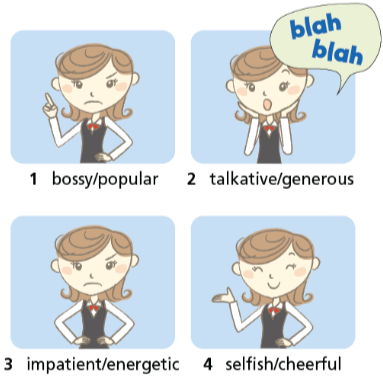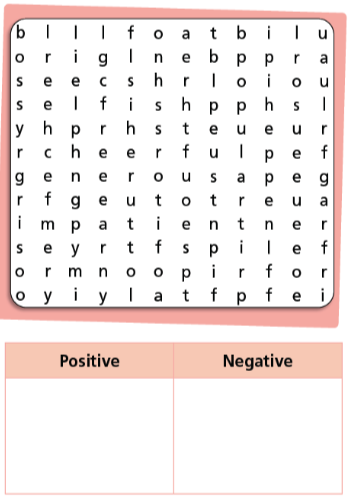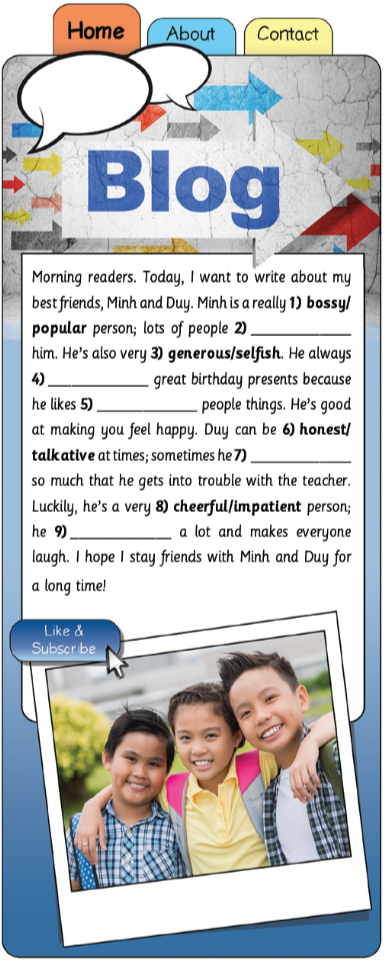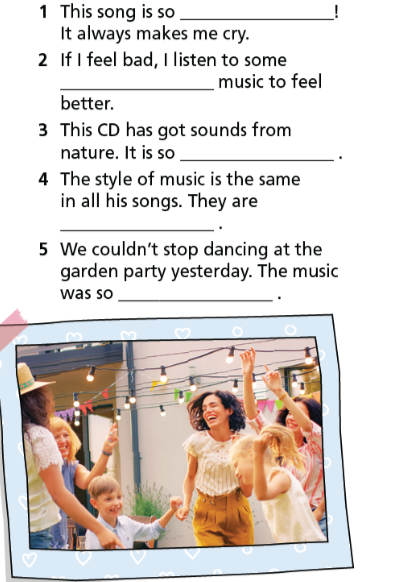2. Choose the correct respone. Read the exchanges aloud. Which words are stressed in each sentences.
( Chọn câu hồi đáp phù hợp. Đọc các sự thay đổi thật to. Từ nào được nhấn ở mỗi câu dưới dây.)

- Câu hỏi Yes/No question nhằm trả lời có hay không một sự kiện, sự việc, hiện tượng nào đó một cách ngắn gọn và trọng tâm. Ngữ điệu trong tiếng Anh của loại câu này là lên giọng ở cuối câu.
Ex: Do you like red?
- Xuống giọng ở câu hỏi Wh - question
- Câu liệt kê lên giọng trước dấu phẩy, và trước liên từ “and”, xuống giọng sau liên từ “and”.
- Lên giọng cuối câu khi người hỏi muốn nhận được câu hỏi chính xác là đúng hay không
- Xuống giọng ở cuối câu khi người nói chắc chắn diều mình nói và mong đợi câu trả lời đồng ý.
1. A: Is she nice? (Cô ấy có tốt không?)
B: a I really like her. (Tôi thực sự thích cô ấy.)
b Yes, she is. (Có, cô ấy là.)
2. A: The new teacher is great! (Giáo viên mới thật tuyệt!)
B: a Oh, really? (Ồ, vậy hả?)
b No, it’s dark actually. (Không, thực ra trời tối.)
3. A: Is his hair black? (Tóc của anh ấy có đen không?)
B: a No, it’s blond, actually. (Không, thực ra là tóc vàng.)
b He’s popular. (Anh ấy nổi tiếng.)
4. A: What’s she like? (Cô ấy thích gì?)
B: a It’s very curly. (Nó rất xoăn.)
b She’s really bossy (Cô ấy thực sự hách dịch.)

Các bài tập cùng chuyên đề
Bài 1 :
Put the correct answer into the box.
Bài 2 :
Put the correct answer into the box.
Bài 3 :
2. Tick (V) the positive adjectives and cross (X) the negative ones.
(Đánh dấu (V) các tính từ khẳng định và gạch chéo (X) các tính từ phủ định.)
|
Vocabulary |
Personality adjectives |
|
✗big-headed bossy chatty hard-working helpful moody outgoing quiet rude cheerful untidy |
|
Bài 4 :
3. Minh, Nam and Linh are talking about Mai. Read their opinions and complete each gap with a word from the Vocabulary box. Listen and check.
(Minh, Nam và Linh đang nói về Mai. Đọc những ý kiến của họ và hoàn thành mỗi phần với 1 từ từ Bảng từ mới. Nghe và kiểm tra.)
 |
Mai loves going out with friends and having fun. She's (1) …
|
 |
Mai's always positive about everything. She always smiles. She's (2) …
|
 |
I like being with Mai. She's friendly, interesting and she loves to talk. She's (3) … |
Bài 5 :
2. Complete the second sentence so that it means the same as the first one. In pairs, say if the sentences are true for you.
(Hoàn thành câu thứ hai sao cho nó đồng nghĩa với câu thứ nhất. Làm việc theo nhóm, hãy nói nếu câu đó đúng với bạn.)
1. I'm not interested in fashion.
I don't think fashion is interesting
2. I get bored when I go shopping for clothes.
I think shopping for clothes
3. In my opinion, today's fashion is annoying.
I feel when I see today's fashion.
4. I'm shocked when I see the prices of new
clothes.
I think the prices of new clothes are
5. I think it's relaxing to wear casual clothes.
I feel when I wear casual clothes.
Bài 6 :
Adjectives ending in -ing and -ed
I can use adjectives ending in -ing and -ed to describe festivals and reactions to festivals.
(Tôi có thể sử dụng các tính từ kết thúc bằng -ing và -ed để mô tả lễ hội và cảm xúc của tôi đối với lễ hội.)
1. Read the results of a survey from 500 teenagers around the world. Do you find any of these surprising?
(Đọc kết quả của một cuộc khảo sát từ 500 thanh thiếu niên trên khắp thế giới. Bạn có thấy bất kỳ điều gì đáng ngạc nhiên không?)
|
Agree (Đồng ý) |
Disagree (Không đồng ý) |
Not sure (Không chắc) |
|
|
I am interested in foreign customs and culture. (Tôi quan tâm đến phong tục và văn hóa nước ngoài) |
42% |
31% |
27% |
|
I am fascinated by traditional performances. (Tôi bị cuốn hút bởi những màn biểu diễn truyền thống.) |
28% |
65% |
7% |
|
I find historical monuments boring. (Tôi thấy các di tích lịch sử thật nhàm chán.) |
73% |
10% |
17% |
|
I think that carnivals are exciting. (Tôi nghĩ rằng lễ hội rất thú vị.) |
86% |
12% |
2% |
Bài 7 :
2. Find two more examples of each rule from the survey in Exercise 1.
(Tìm thêm hai ví dụ về mỗi quy tắc từ khảo sát trong Bài tập 1.)
|
Grammar (Ngữ pháp) |
Adjectives ending with -ing and-ed |
|
Adjectives ending in -ed describe our feelings or reactions. (Các tính từ kết thúc bằng -ed mô tả cảm xúc hoặc phản ứng của chúng ta.) Most teens still easily get bored when visiting museums and historical sites. (Hầu hết thanh thiếu niên vẫn dễ cảm thấy nhàm chán khi đến thăm các viện bảo tàng và di tích lịch sử.)
Adjectives ending in -ing describe the causes of our feelings or its effect on somebody. (Các tính từ kết thúc bằng -ing mô tả nguyên nhân của cảm giác của chúng ta hoặc ảnh hưởng của nó đối với ai đó.) I find historical monuments boring. (Tôi thấy các di tích lịch sử thật nhàm chán.) |
|
Bài 8 :
3. Complete the table below.
interesting → interested
boring → 1________
exciting → excited
2_______ → fascinated
frightening → 3________
4 ________ → challenged
5 ________ → tired
Bài 9 :
4. Add an -ed or -ing ending to the adjectives in the conversation.
(Thêm đuôi -ed hoặc -ing vào các tính từ trong cuộc hội thoại.)
Vinh : Did you see Holi Festival when you were in India. Was it as interest______ as
everyone says it is?
Nathan : I did see it. I wasn't really interest_______ in going in the first place, but my sister insisted.
Vinh : Did you enjoy it?
Nathan : Certainly, I found the story about it the most fascinat__________ part of the festival.
Vinh : Really? Didn't you like all the colours and people throwing powder on you?
Nathan : At first, I did. But I eventually got tir_________ of it. No matter where I went, I got covered with powder.
Vinh : Yes, that would get tir_______ after a while.
Nathan : They actually threw water on everyone, too. But I didn't mind that too much. Actually, I found it kind of refresh___________.
Bài 10 :
5. Make statements with the adjectives and clues given. Change the form of the adjectives if necessary.
(Hãy phát biểu với những tính từ và gợi ý đã cho. Thay đổi hình thức của các tính từ nếu cần thiết.)
- fascinated-colourful costumes.
I am fascinated with their colourful costumes.
- boring-long ceremonies.
_____________________________________.
- frightening-air travel.
_____________________________________.
- interested-folk dancing.
_____________________________________.
- challenging-learning foreign language.
_____________________________________.
A : Are you fascinated with colourful costumes?
B : No, I'm not.
Bài 11 :
3. Complete the responses with the correct words.
(Hoàn thành các câu trả lời bằng các từ đúng.)
1. A: Tom finished his project early.
B: That’s________ (surprising / surprised).
2. A: We didn’t enjoy Rio Carnival very much. I don’t think I will recommend it.
B: I’m________ to hear that. (shocking / shocked)
3. A: Did you see the documentary about Lunar New Year festivals on TV last night?
B: Yes, I found it very________ (interesting / interested).
4. A: I don’t think I want to see another performance today.
B: Why? Do they make you feel________ (boring / bored)?
Bài 12 :
5.VOCABULARY PLUS Complete the sentences with the words.
(Hoàn thiện các câu sau với các từ cho sẵn.)

This is a big international airport. You can go to a lot of different countries from here.
1 Mary is – look at her beautiful picture. She writes good stories too!
2 When I see something , I laugh.
3 Toby’s T-shirt is very – it’s blue, red, yellow and pink.
4 Emojis are very – you can communicate different feelings with them.
Bài 13 :
1. Choose the correct option.
(Chọn đáp án phù hợp.)

Bài 14 :
2. Find 6 character adjectives in the word search. Then list them under the correct heading.
(Tìm 6 tính từ chỉ tính cách trong bảng tìm chữ cái. Sau đó xếp vào tiêu đề phù hợp.)

Bài 15 :
3. Choose the correct option, then complete the blog with the verbs below.
(Chọn câu trả lời phù hợp, sau đó hoàn thành bài blog với các động từ dưới đây.)
|
giving talks like smiles buys |

Bài 16 :
2. Fill in each gap with generous, cheerful, selfish, talkative, popular, honest, energetic, bossy or impatient.
(Điền vào chỗ trống với các tính từ generous, cheerful, selfish, talkative, popular, honest, energetic, bossy or impatient.)
1. He hates waiting for things. He's _______.
2. She talks a lot. She's _______.
3. He likes telling people what to do. He's _______.
4. She smiles a lot. She's _______.
5. He likes giving people things. He's _______.
6. Lots of people like her. She's _______.
7. He only cares about himself. He's _______.
8. She always tells the truth. She's _______.
9. He does a lot of things. He's _______.
Bài 17 :
1.Write the adjective under positive or negative
(Viết các tính từ sau vào cột tích cực hoặc tiêu cực.)

Positive Negative
exciting
Bài 18 :
2. Choose the correct words for the definitions.
(Chọn từ đúng cho các câu giải thích nghĩa bên dưới.)
When someone is nice to other people brave/kind/uncommon
1 When something is bad, or it makes you feel unpleasant exciting/brilliant/terrible
2 When a thing is good and helpful for doing something cruel/useful/useless
3 When something is rare or unusual or not frequent popular/scary/uncommon
4 When a person isn’t scared and is ready to do difficult or dangerous things brave/tiny/brilliant
5 When something is very bad, for example, the weather enormous/useful/awful
6 When a person hasn’t got much money poor/cruel/alive
7 When something is easy to recognize relaxing/familiar/enormous
8 When a book or film is very good brilliant/cruel/dead
Bài 19 :
3.Complete the text with the words in the box.
(Hoàn thành đoạn văn với các từ được cho trong bảng.)

I live in London and my favourite place is an old museum called Madame Tussauds. When people hear the words ‘old museum’, they think it’s a boring place, but they’re wrong – Madam Tussauds isn’t boring, it’s very (1)! It’s a waxwork* museum with figures of famous people. Madame Tussauds is also very (2), with 2.5 million visitors every year in London, and they have museums in other cities across the world. It’s got a really (3) collection of figures – over 400!
The figures are all different. Some are very tall – the Incredible Hulk is 4.5 metres! But others are (4) like the 16 cm Tinker Bell from Peter Pan. Many of figures are (5)celebrities with a lot of money like Rihnna or Taylor Swift. But there are also people from the past like King Henry VIII of England – some people think he was a (6)and terrible person!
*a waxwork: a person made from wax; we use wax for making candles
Bài 20 :
4. Fill in each gap with happy, exciting, sad, boring, relaxing.
(Điền vào chỗ trống với happy, exciting, sad, boring, relaxing.)

Bài 21 :
1. Match the words with the descriptions.
(Ghép các chữ với mô tả.)
1. A new, exciting and possibly dangerous experience: adventure.
2. Get angry and sometimes fight other people: a _ _ _ _ _ _ _ _ _.
3. Not think carefully about what to do or say: u _ _ _ _ _ _ _ _ _.
4. Feel nervous and uncomfortable when being with other people: s _ _ _.
Bài 22 :
a. Unscramble the words.
(Xắp xếp lại từ.)

Bài 23 :
b. Write the words from Task. a next to the correct meaning.
(Viết các từ trong Bài a bên cạnh nghĩa đúng.)
1. This is when a student does poorly on a test.
(Đây là khi một học sinh làm bài kiểm tra kém.)
2. This is how you feel when you are happy.
(Đây là cách bạn cảm thấy khi bạn hạnh phúc.)
3. This is how you feel when you think something will be good, but it is bad.
(Đây là cảm giác của bạn khi bạn nghĩ rằng điều gì đó sẽ tốt, nhưng nó lại tệ.)
4. This is how you feel when you are very sad.
(Đây là cách bạn cảm thấy khi bạn rất buồn.)
5. This is how you feel when you are very, very happy.
(Đây là cảm giác của bạn khi bạn đang rất rất hạnh phúc.)
6. This is when a student does well on a test.
(Đây là khi một học sinh làm tốt bài kiểm tra.)
7. This is how you feel when something unexpected happens.
(Đây là cách bạn cảm thấy khi có điều gì đó bất ngờ xảy ra.)
8. This is how you feel when you are angry.
(Đây là cảm giác của bạn khi bạn tức giận.)
Bài 24 :
1. Choose the correct option.
(Chọn ý đúng.)
1. I am very interested / interesting in street dances during Đà Lạt Flowers Festival.
2. I am fascinated / facinating by the firework displays every New Year Eve.
3. The elephant race is very interested / interesting to the tourists.
4. Tourists are really excited / exciting about throwing water on other people in the street.
5. Some street performances are fascinated / fascinating.
Bài 25 :
2. Correct the sentences.
(Sửa đúng các câu.)
1. I get boring easily when watching documentary films.
I get bored when watching documentary films.
(Tôi cảm thấy chán khi xem phim tài liệu.)
2. Their party was very excited.
3. I am so exciting about travelling to Phú Quốc this summer.
4. I feel very tiring after walking the whole morning.
5. Not many teenagers are interesting in historical sites.
Bài 26 :
3. Order the words to make sentences.
(Sắp xếp các từ để tạo thành câu.)
1. I / their / excited / watching / live / performance / am / about /.
I am excited about watching their live performance.
(Tôi phấn khích khi xem buổi biểu diễn của họ.)
2. I / films / boring / documentary / find /.
3. performance / the / not / interesting / me / very / to / was /.
4. colourful / costumes / the / fascinated / tourists / are / the / by/.
5. day / tiring / whole / is / the / walking / very /.
Bài 27 :
4. Complete the sentences with the correct adjectives.
(Hoàn thành các câu với tính từ đúng.)

1. Tourists are facinated by the sounds of gongs during the elephant race.
(Các du khách phấn khích bởi âm thanh của cồng chiêng trong cuộc đua voi.)
2. Local people are ___ about wearing their traditional costumes.
3. Learning another foreign language is ___ to me. I find it difficult to remember new words.
4. Many foreign tourists find water festivals in South East Asia ___. They really enjoy throwing water on each other.
5. I always find snakes ___. I really hate them.

Bài 28 :
3. Choose the correct answer.
(Chọn câu trả lời đúng.)
1. I was surprising / surprised by the race result.
2. I’m watching an exciting / excited race on TV at the moment.
3. This is the most interesting / interested football match I have ever watched.
4. I feel tiring / tired when travelling by ship.
5. Colourful costumes at the festival are fascinating / fascinated.


















Danh sách bình luận